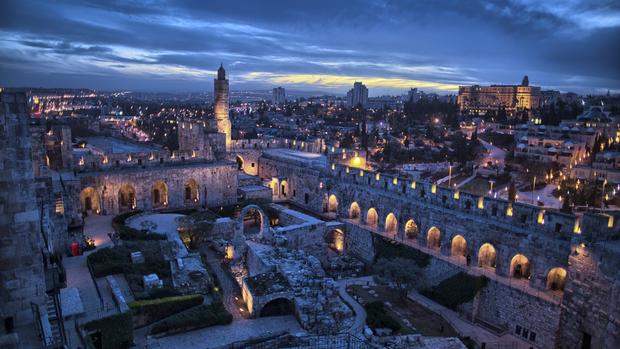Jerusalem's holiest site for Jews and Muslims at center of new dispute
JERUSALEM - Israel's prime minister vowed to maintain longstanding worship arrangements at Jerusalem's most sensitive religious site Sunday, calling for calm and restraint amid rising tensions in the city.
Palestinian protesters and Israeli police have clashed almost daily in east Jerusalem in recent months, with much of the unrest focused on a sacred compound revered by both Jews and Muslims.
It is the holiest site for Jews, who call it the Temple Mount because of the revered Jewish Temples that stood there in biblical times. Muslims refer to it as the Noble Sanctuary, and it is their third holiest site, after Mecca and Medina in Saudi Arabia.
"Since the days of Abraham, the Temple Mount has been the holiest site for our people and with this, the Temple Mount is also the most sensitive kilometer on earth," Benjamin Netanyahu said at his weekly cabinet meeting.
"Alongside our determined stance for our rights, we are determined to maintain the status quo for all the religions in order to prevent an eruption," he added.
Israel captured east Jerusalem - with its sites sacred to Jews, Muslims and Christians - from Jordan in the 1967 war. Palestinians demand the territory for their future capital. The fate of the area is an emotional issue for Jews and Muslims and its future lies at the heart of the conflict between Israel and the Palestinians.
Last week in Jerusalem, a Palestinian gunman on a motorcycle shot and seriously wounded a U.S.-born activist who was a leading voice in expanding Jewish prayer rights on the hilltop complex. Muslim worshippers view Jewish prayer at the site as a provocation, and Israeli authorities place tough restrictions on it.
Palestinian President Mahmoud Abbas praised Netanyahu's call for preserving the status quo, calling it a "step in the right direction."
In a statement, he warned of the consequences of the "violation and provocations by the extremists that would lead to serious results in the entire region and ignite the instability in Palestine and the region."
Israel has accused Abbas, who has called for banning Jews from the holy site, of inciting the violence.
"It is very easy to ignite a religious fire but much harder to extinguish it," Netanyahu said.
Moshe Feiglin, a lawmaker from Netanyahu's Likud party, visited the site without incident earlier in the day.
East Jerusalem has experienced unrest since the summer, with Palestinian youths throwing stones and firebombs at motorists and clashing frequently with Israeli police. The violence gained steam last month, when a Palestinian motorist rammed his car into a crowded train station, killing a 3-month-old Israeli-American girl and a woman from Ecuador.
Israel approved an amendment to the penal code Sunday that would enforce tougher punishment - up to 20 years in prison - for Palestinians who throw rocks at cars.
Earlier in the day, Israel shut its crossings with the Gaza Strip except for humanitarian aid after militants fired a rocket into its territory over the weekend. It was the second such attack since the end of the end of last summer's 50-day Gaza war.
The army said the rockets exploded in open fields and caused no injuries. Egypt has also closed its border crossing with Gaza since a deadly attack on its soldiers in the nearby Sinai desert on Oct. 24.
In Gaza, the dominant Hamas militant group said it opposes a U.N. reconstruction plan for Gaza. Hamas spokesman Sami Abu Zuhri on Sunday called the U.N. mechanism "unacceptable, inefficient."
The U.N. announced the plan in September, creating a system to bring in badly needed reconstruction materials while ensuring that Hamas does not divert items for military use.
Despite its unhappiness with the system, Abu Zuhri gave no indication that Hamas will disrupt the shipments.
Hamas is not part of the agreement, which was reached between the U.N., Israel and the West Bank-based Palestinian Authority. The authority recently formed a unity government of apolitical technocrats, but Hamas remains the dominant force in Gaza. Facing international isolation and economic hardship, Hamas appears to have little choice but to allow the mechanism to function.
